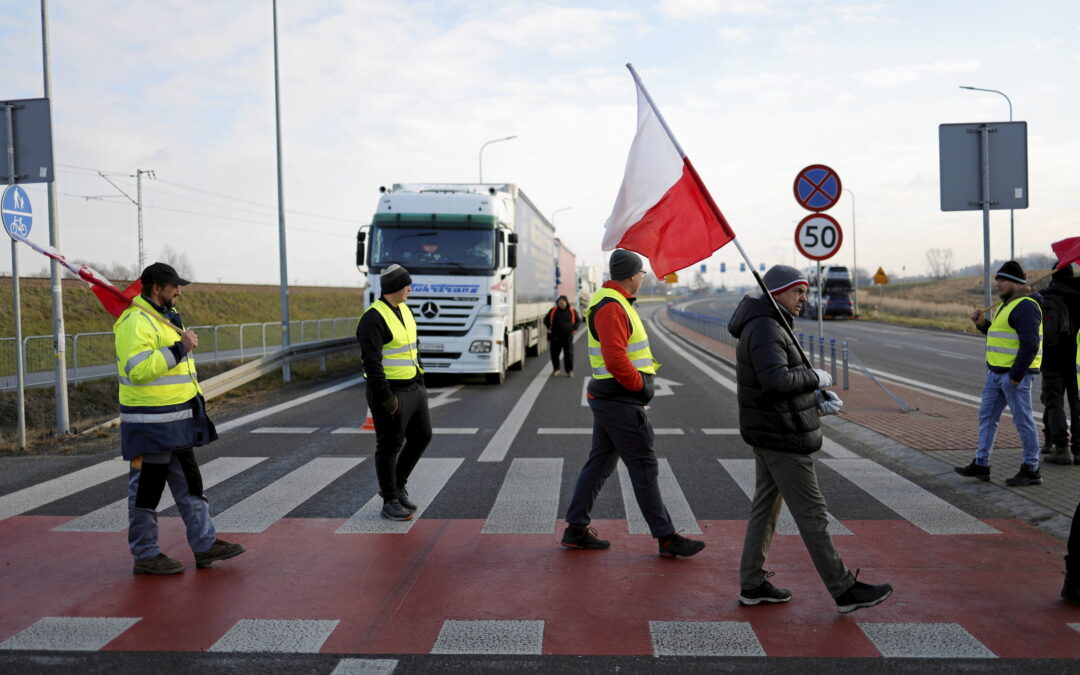Keep our news free from ads and paywalls by making a donation to support our work!

Notes from Poland is run by a small editorial team and is published by an independent, non-profit foundation that is funded through donations from our readers. We cannot do what we do without your support.
Polish farmers on Saturday began a renewed blockade of a border crossing with Ukraine, this time in protest against a proposed EU free trade deal with South America and a Polish agricultural tax. However, on Sunday the action was suspended for two weeks following a visit by Poland’s agriculture minister.
Kyiv has criticised the protest, noting that the farmers’ demands have nothing to do with Ukraine and also expressing sorrow that the blockade was launched on the anniversary of a Soviet-era famine that killed millions of Ukrainians.
Farmers in southeastern Poland staged a new protest at the Ukrainian border on Saturday, using the blockade to pressure the Polish government for additional subsidies and tax breaks and to oppose the EU's trade deal with… Latin American countries. 🧵 #Mercosur #UkraineWar pic.twitter.com/CeE4sUrvWq
— Bartosz Brzeziński (@thisisbartosz) November 24, 2024
The protest was launched by a group of 30 farmers from Oszukana Wieś (meaning “Deceived Countryside”) – a group that was also involved in previous long-running protests at the border – at the Medyka crossing with Ukraine.
Similarly to previous protests, they let only one truck per hour pass into Ukraine and blocked trucks coming into Poland completely. The blockade did not apply to cars, buses, or humanitarian and military transports.
The demonstration was held in response to the EU’s proposed free trade agreement with the South American Mercosur trade bloc.
“We do not want an influx of this food from South America. It does not meet standards. This food is not fit to eat,” Karina Strzelec from the farmers’ organisation told broadcaster TVN.
“We are Polish farmers, we produce our own healthy Polish food and we want our children, our residents, our families to eat healthy Polish food, without chemicals and antibiotics,” she added.
The farmers are also protesting in response to what they say are broken promises by the government to reduce the amount they must pay in agricultural tax this year, reports the Rzeczpospolita daily.
One of the protest leaders, Roman Kondrów, was asked why they are blockading the border with Ukraine, given that the country has nothing to do with either the Mercosur deal or Polish agricultural tax.
“And where should we appeal, should we go to Mr Tusk?” he replied, referring to Prime Minister Donald Tusk. “I was counting on cooperation with the government, that someone would come and listen to us…That is why we wanted to exert pressure on the border.”
Rolnicy rozpoczęli całodobową blokadę drogi krajowej numer 28 przed granicą w Medyce. Protest ma potrwać do końca roku.https://t.co/H9HScJ95PC
— tvn24 (@tvn24) November 23, 2024
The blockade prompted criticism from Ukraine, which noted that it was launched on the day that the country commemorates the Holodomor, a human-made famine in the 1930s that killed millions of Ukrainians.
“This tragedy teaches us that restricting access to food and violating the principles of solidarity can have disastrous consequences,” wrote the Ukrainian embassy in Warsaw.
“The blocking of the Ukrainian border by Polish farmers because of demands that have nothing to do with Ukraine looks like a particularly painful paradox on this sad day,” they added.
“Such actions not only harm the economic interests of both countries, but also work to the advantage of those who want to sow discord between Ukrainians and Poles.”
Komentarz Ambasady Ukrainy w Rzeczypospolitej Polskiej do blokady granicy ukraińsko-polskiej na przejściu granicznym Medyka-Szeginiehttps://t.co/xL0jf733PD pic.twitter.com/cxkLNhY0cc
— Ukraine in Poland (@UKRinPL) November 23, 2024
On Sunday, Poland’s agriculture minister, Czesław Siekierski, visited the protesters. He promised to respond to their demands by 10 December and announced that the ministry is preparing a negative opinion on the EU-Mercosur trade deal to be presented at Tuesday’s cabinet meeting.
The farmers subsequently agreed to suspend their protest pending the ministry’s response. But they threatened to resume it and demand a meeting with Tusk if the ministry does not react in time.
On Friday, before the protest began, Siekierski had already announced his opposition to the trade deal in its current form, which he said would harm Polish farmers. After talks with his French counterpart, he also said that France has reservations about the agreement.
The last two years have seen a series of protests by Polish farmers and truckers against what they say is unfair competition from Ukraine, which has worsened due to the impact of Russia’s war.

Notes from Poland is run by a small editorial team and published by an independent, non-profit foundation that is funded through donations from our readers. We cannot do what we do without your support.
Main image credit: Patryk Ogorzalek / Agencja Wyborcza.pl

Agata Pyka is a former assistant editor at Notes from Poland. She specialises in Central and Eastern European affairs, cybersecurity, and investigative reporting. She holds a master’s degree in political communication from the University of Amsterdam, and her work has appeared in Euractiv, the Balkan Investigative Reporting Network (BIRN), and The European Correspondent, among others.



















